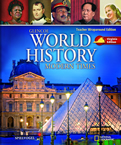Glencoe World History: Modern Times © 2011 Virginia EditionChapter 5:
Renaissance and ReformationStudent Web Activity Lesson PlansUlrich Zwingli Introduction Ulrich Zwingli led the Reformation in Switzerland and had an important role in formulating some of the movement's most influential ideas. In this activity students will become familiar with Zwingli's major contributions to the Reformation. Lesson Description
Students will go to a Web site about Ulrich Zwingli and his contributions to the Reformation. They will read about Zwingli's ideas and his break with Martin Luther. Then they will answer four questions about what they have read and create a poster inviting the citizens of Zürich to an imaginary debate between Martin Luther and Zwingli about the Reformation. Instructional Objectives - The learner will be able to describe Zwingli's ideas about the scriptures.
- The learner will be able to explain the difference in viewpoints between Martin Luther and Ulrich Zwingli.
Student Web Activity Answers - Zwingli refused to fight in foreign wars, and he opposed indulgences.
- The city of Zürich adopted Zwingli's reforms and became the first Protestant state outside of Germany. The Protestant revolution spread from Zürich across Switzerland.
- Zwingli's fundamental belief was that if a Christian theory was not states explicitly in the New Testament, then no Christian should believe it or practice it. It was on this basis that he criticized the practice of indulgences and the Catholic fast at Lent.
- Zwingli disagreed with Luther over several issues. Luther was unwilling to give up many Catholic ceremonies or to read Christian scriptures literally. The two also disagreed over the issue of the Eucharist. This was tied to the larger issue of whether Jesus was regarded as both God and human, or strictly as a divine figure. Historically, the disagreement of Luther and Zwingli on basic theology dashed the hopes of having a united Protestant front.
- Students' posters will vary but should include a date and place for the debate (Philip of Hesse’s castle in Marburg, Germany, October 1529) and brief outlines of the two debaters' viewpoints.
 | 

















